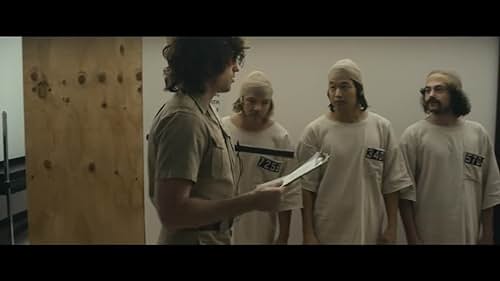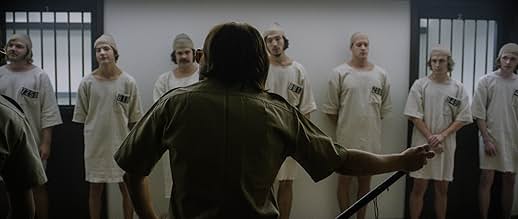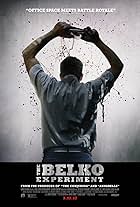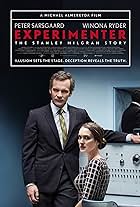VALUTAZIONE IMDb
6,8/10
47.044
LA TUA VALUTAZIONE
Nel 1971, ventiquattro studenti vengono selezionati per un esperimento in cui assumono i ruoli di detenuto o carceriere in una finta prigione allestita nel sotterraneo della facoltà di psico... Leggi tuttoNel 1971, ventiquattro studenti vengono selezionati per un esperimento in cui assumono i ruoli di detenuto o carceriere in una finta prigione allestita nel sotterraneo della facoltà di psicologia di Stanford.Nel 1971, ventiquattro studenti vengono selezionati per un esperimento in cui assumono i ruoli di detenuto o carceriere in una finta prigione allestita nel sotterraneo della facoltà di psicologia di Stanford.
- Premi
- 4 vittorie e 3 candidature totali
Trama
Lo sapevi?
- QuizAlthough never mentioned in the movie, the real life experiment was funded by the U.S. Office of Naval Research and was of interest to both the U.S. Navy and Marine Corps as an investigation into the causes of conflict between military guards and prisoners.
- BlooperWhen Dr. Zimbardo speaks with his colleague, the colleague says that he will see him at the beginning of the semester. Stanford does not have semesters; rather, it has a quarter academic calendar.
- Citazioni
Daniel Culp: I know you're a nice guy.
Christopher Archer: So why do you hate me?
Daniel Culp: Because I know what you can become.
Recensione in evidenza
This film is a dramatization of a real psychological experiment that took place at the Stanford University in 1971. The motivation was to study the dynamics of individuals who were arbitrarily placed into roles as prisoners and guards at a simulated prison. Since none of the study participants were actual criminals or correction officers, the idea was to glean insight into the psychology of the power imbalance that arises from the situation, as opposed to the people involved.
Things famously degraded quickly and the experiment was terminated after only six days. Multiple guards displayed sadistic traits and performed acts of psychological and even (to a smaller degree) physical torture, all overseen, permitted, and arguably encouraged by "superintendent" Philip Zimbardo, the study's creator.
The conditions the participants were exposed to were reprehensible, but even worse is that ultimately this was simply bad science, making the whole endeavor a cruel waste of time. The experiment lacked much of the basic rigor required, as highlighted in the film by a verbatim repetition of an actual conversation Mr. Zimbardo had with a colleague who questioned some of the basic scientific methodologies being utilized in the study.
Zimbardo himself committed what I would consider borderline criminal acts such as initially denying "prisoner" participants the option to leave when requested (to instill in them the belief that their situation was, in fact, real), which came frighteningly close to converting the "study" into a criminal act of kidnapping in my opinion.
Zimbardo explains this as him getting "to close" to the experiment, but personally I'm not particularly sympathetic to that argument. When you watch the actual clips from the study and read the notes, I'm more inclined to think that Mr. Zambardo himself had a sadistic streak that he failed to control for a time. Honestly, I think the man should have faced criminal charges for his role in this fiasco.
In the end, some good did come out of this experiment in that it created a push for establishing standards and controls for psychological experiments in the future.
Despite knowing the actual outcome, I still felt anxious about the fates of the young men involved, a testament to the power of the acting and directing here. To me, this movie is a chilling and visceral reminder of how easy it is to create conditions that foster cruelty and dehumanization. A rewarding, if somewhat depressing, film to watch.
Things famously degraded quickly and the experiment was terminated after only six days. Multiple guards displayed sadistic traits and performed acts of psychological and even (to a smaller degree) physical torture, all overseen, permitted, and arguably encouraged by "superintendent" Philip Zimbardo, the study's creator.
The conditions the participants were exposed to were reprehensible, but even worse is that ultimately this was simply bad science, making the whole endeavor a cruel waste of time. The experiment lacked much of the basic rigor required, as highlighted in the film by a verbatim repetition of an actual conversation Mr. Zimbardo had with a colleague who questioned some of the basic scientific methodologies being utilized in the study.
Zimbardo himself committed what I would consider borderline criminal acts such as initially denying "prisoner" participants the option to leave when requested (to instill in them the belief that their situation was, in fact, real), which came frighteningly close to converting the "study" into a criminal act of kidnapping in my opinion.
Zimbardo explains this as him getting "to close" to the experiment, but personally I'm not particularly sympathetic to that argument. When you watch the actual clips from the study and read the notes, I'm more inclined to think that Mr. Zambardo himself had a sadistic streak that he failed to control for a time. Honestly, I think the man should have faced criminal charges for his role in this fiasco.
In the end, some good did come out of this experiment in that it created a push for establishing standards and controls for psychological experiments in the future.
Despite knowing the actual outcome, I still felt anxious about the fates of the young men involved, a testament to the power of the acting and directing here. To me, this movie is a chilling and visceral reminder of how easy it is to create conditions that foster cruelty and dehumanization. A rewarding, if somewhat depressing, film to watch.
I più visti
Accedi per valutare e creare un elenco di titoli salvati per ottenere consigli personalizzati
- How long is The Stanford Prison Experiment?Powered by Alexa
Dettagli
- Data di uscita
- Paese di origine
- Sito ufficiale
- Lingua
- Celebre anche come
- The Stanford Prison Experiment
- Luoghi delle riprese
- Aziende produttrici
- Vedi altri crediti dell’azienda su IMDbPro
Botteghino
- Lordo Stati Uniti e Canada
- 660.561 USD
- Fine settimana di apertura Stati Uniti e Canada
- 37.514 USD
- 19 lug 2015
- Lordo in tutto il mondo
- 663.114 USD
- Tempo di esecuzione2 ore 2 minuti
- Colore
- Proporzioni
- 2.35 : 1
Contribuisci a questa pagina
Suggerisci una modifica o aggiungi i contenuti mancanti







































